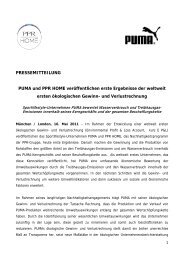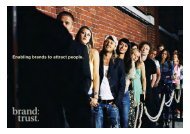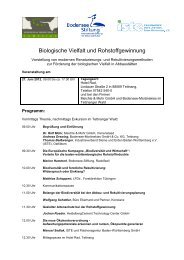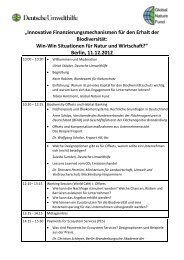here - the European Business and Biodiversity Campaign!
here - the European Business and Biodiversity Campaign!
here - the European Business and Biodiversity Campaign!
You also want an ePaper? Increase the reach of your titles
YUMPU automatically turns print PDFs into web optimized ePapers that Google loves.
III. Presentations: How can NGOs design partnerships with companies? – Am<strong>and</strong>a del Rio__________________<br />
4. How can NGOs design partnerships with companies? Some practical advice<br />
Presentation by Am<strong>and</strong>a del Rio, Fundacion Global Nature España<br />
Am<strong>and</strong>a started with a brief introduction to FGN, followed by a presentation of several projects<br />
involving collaboration with companies such as cleaning up <strong>the</strong> effects of an oil spill which has been<br />
caused by BP. Ano<strong>the</strong>r project involves legume cropping in protected areas, with <strong>the</strong> intention of<br />
selling <strong>the</strong>se legumes to <strong>the</strong> Carrefour supermarket chain. The money is <strong>the</strong>n used to support <strong>the</strong><br />
conservation of Natura 2000 sites. A third project is about a plant nursery which has <strong>the</strong> purpose of<br />
growing endemic species. Children, elderly <strong>and</strong> disabled people participate in this project.<br />
All stakeholders (competitors of <strong>the</strong> company, o<strong>the</strong>r NGOs, different governments, scientific bodies<br />
etc.) take part within <strong>the</strong> mentioned projects. T<strong>here</strong> is no blue print for cooperation. The projects in<br />
general are adapted to <strong>the</strong> respective stakeholders taking part.<br />
Some companies want a broader media exposure than o<strong>the</strong>rs.<br />
The extent of media exposure influences <strong>the</strong> results of <strong>the</strong><br />
projects. Companies can be interested in <strong>the</strong>se projects, for<br />
example due to <strong>the</strong> amount of exposure being given. However,<br />
<strong>the</strong> project delivers real benefits in protecting nature.<br />
Unilever collaborated with FGN<br />
to restore wetl<strong>and</strong>s.<br />
(Source: FGN)<br />
Working toge<strong>the</strong>r with companies means that NGOs are<br />
innovating: research is <strong>the</strong> transformation of money into<br />
knowledge <strong>and</strong> innovation <strong>the</strong> transformation of knowledge<br />
into money. It is also about practical implementation <strong>and</strong> <strong>the</strong> use<br />
of creativity. The business sector can provide a stable income for<br />
NGOs. Before collaborating, many stereotypes need to be overcome. Both partners also need to<br />
define <strong>the</strong> type of partnership <strong>the</strong>y want to start: communication, dialogue or participation. These all<br />
have different commitments, instruments <strong>and</strong> temporal horizon.<br />
Lessons learned by both parties:<br />
� Different visions do not need to be obstacles<br />
� NGOs can be mediators<br />
� Both companies <strong>and</strong> NGOs give more value to direct contact with <strong>the</strong> o<strong>the</strong>r party than <strong>the</strong> use of<br />
certification <strong>and</strong> external guidelines<br />
� Round tables are used to facilitate developments, agreements <strong>and</strong> commitment<br />
Both parties benefit from <strong>the</strong> mutual access to contacts <strong>and</strong> expertise. Sharing is <strong>the</strong> key in <strong>the</strong>se<br />
projects. To avoid <strong>the</strong> failing of projects, one should not have too high expectations, hold regular<br />
meetings <strong>and</strong> begin with a proposal <strong>and</strong> smaller projects.<br />
7








